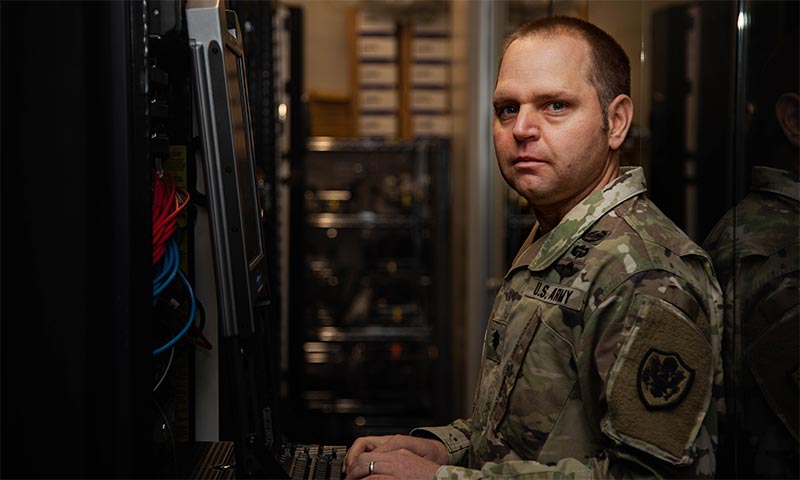
The Naval Postgraduate School (NPS) has added a new capability to the university’s technological toolbelt with a node connecting NPS to the Joint Information Operations Range (JIOR). This advanced capability provides NPS faculty and students with access to a globally-distributed, closed-loop, live-fire cyber range complex that integrates users and capability providers to enable classified training, testing and experimentation.
The node and installation were supported by the Joint Staff J7, recognizing the critical role of NPS in bringing together DOD and industry partners for collaboration on key defense-related areas.
U.S. Army Lt. Col. Michael Senft, a military faculty lecturer in the NPS Department of Computer Science, worked diligently with the Joint Staff J7 and multiple stakeholders across NPS to bring the JIOR node installation to fruition despite challenges created by the current COVID environment. The JIOR is a closed-loop, scalable and transportable network providing a secure and accredited training and test environment. This capability provides students and faculty researchers access to both persistent and ephemeral training and testing event environments.
“Access to the JIOR helps support the essential classified research and education mission of NPS,” Senft said. “This node connects NPS to other organizations with access to the JIOR through creation of virtual test ranges for evaluation of cyber capabilities.”
JIOR connectivity enables NPS students and faculty to connect with realistic cybersecurity environments including the National Cyber Range Complex, Persistent Cyber Training Environment, and CyberTropolis. CyberTropolis, located at the Muscatatuck Urban Training Center in Indiana, replicates the cyber environment of a real city.
“The JIOR allows organizations to connect securely at multiple classification levels to test and evaluate different programs and capabilities,” stressed Senft. “The information technology architecture on a Navy ship, for example, is not something that we can replicate in an unclassified environment. JIOR allows NPS to securely connect with organizations that have existing physical and virtual environments identical to those present on a ship to allow testing of new capabilities.”
The JIOR currently has over 100 access points across the U.S. and other countries. This allows NPS to securely connect with other organizations including many that are developing next-generation capabilities for the DOD.
“Our industry partners are key and being able to collaborate with them in a secure environment is enabled by JIOR,” added Senft. “We are able to conduct tests and evaluations on a temporary network designed for a specific testing or experimentation event.”
Given the prevalence of cyber-related capabilities across current DOD and DON strategies, expanding NPS research capabilities in cyber at the classified level was part of the university’s strategy. NPS’ connection to the JIOR is a completed action from the NPS 2018-2023 Strategic Plan to support expansion of classified cyberspace operations research and education. Specifically, action S4.2 states, “We will upgrade our classified networks to ensure uninterrupted, high-speed access at the Top-Secret level to our sponsors and provide them with enhanced test environments. We will establish a Joint Information Operations Range node at NPS in order to support visibility and participation in classified experiments and exercises.”


